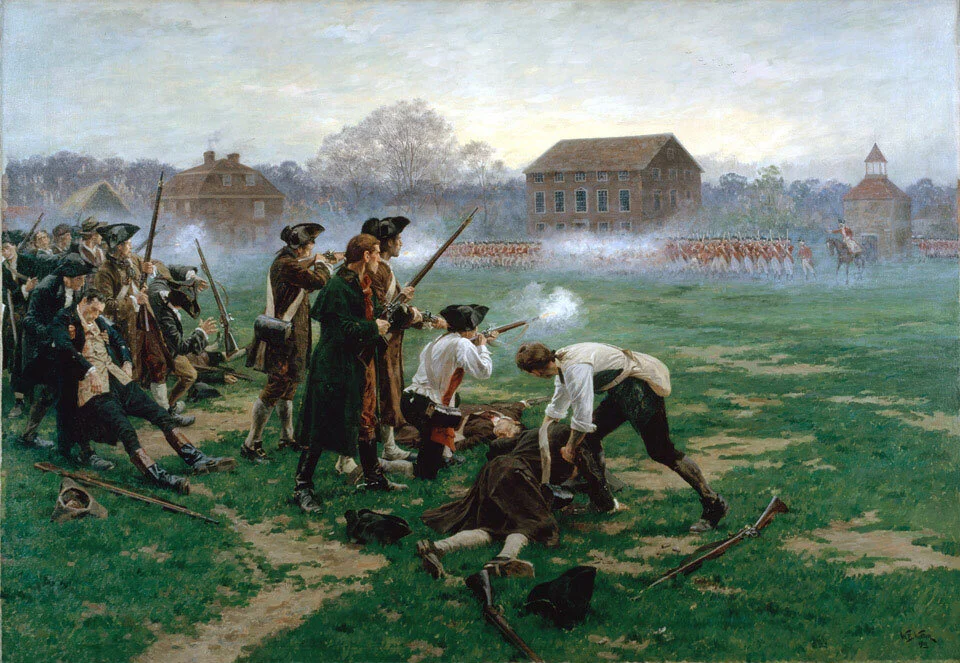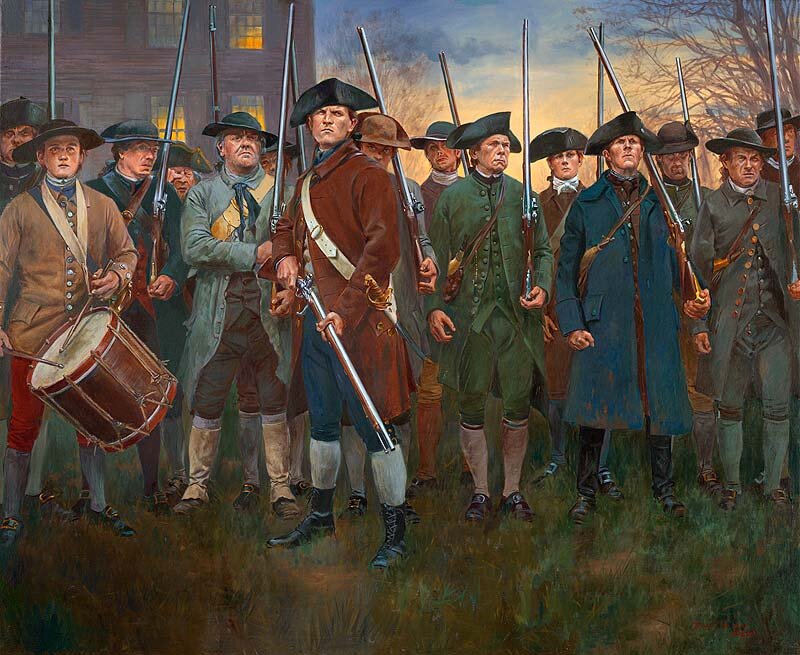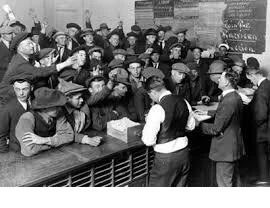The Shot Heard ‘Round the World: April 19th, 1775
On April 19th, 1775, British militia and British soldiers fought each other in the first battles of the American Revolution at the Massachusetts towns of Lexington and Concord. It was not taxation without representation, martial law replacing their elected representatives, nor a common desire to secede from Great Britain that was the final straw that broke the camel’s back. It was common sense gun control.
Following British victory at the end of the French and Indian War (7 Years War 1756-1763), the Empire had a massive debt.
Parliament imposed taxes and regulations on the colonies after a period of “benign neglect,” notably the Sugar Act (April 5th, 1764), the Stamp Act (March 22nd, 1765), the Declaratory Act (March 18, 1766), and the Tea Act (May 10, 1773).
These were meant to pay the war debts and strengthen Parliament’s power.
This resulted in civil and uncivil disobedience, especially in Boston, Massachusetts, as exemplified by the Boston Massacre (March 5, 1770) and the Boston Tea Party (Dec 6, 1773).
In response, Parliament passed the Intolerable Acts (March-June 1774).* The acts put Massachusetts under martial law.
The Continental Congress was formed by 13 English colonies to address the Intolerable Acts. In an Oct 14, 1774 letter to King George III, called the Declaration of Rights and Grievances, they wrote,
“And whereas, in the last session of parliament, three statutes were made; ‘one, intituled An act to discontinue, in such manner and for such time as are therein mentioned, the landing and discharging, lading, or shipping of goods, wares & merchandise, at the town, and within the harbour of Boston, in the province of Massachusetts-bay, in North-America;’ another, intituled ‘An act for the better regulating the government of the province of the Massachusetts-bay in New-England;’ and ‘another, intituled An act for the impartial administration of justice, in the cases of persons questioned for any act done by them in the execution of the law, or for the suppression of riots and tumults, in the province of the Massachusetts-bay, in New-England.’
[…]
The good people people of the several Colonies of New-hampshire, Massachusetts-bay, Rhode-island and Providence plantations, Connecticut, New-York, New-Jersey, Pennsylvania, Newcastle, Kent and Sussex on Delaware, Maryland, Virginia, North Carolina, and South Carolina, justly alarmed at these arbitrary proceeding of parliament and administration, have severally elected, constituted, and appointed deputies to meet and sit in general congress, in the city of Philadelphia, in order to obtain such establishment, as that their religion, laws, and liberties may not be subverted[…]”[1]
The Congress then asserted their rights as Englishmen,
That the inhabitants of the English Colonies in North America, by the immutable laws of nature, the principles of the English constitution, and the several charters or compacts, have the following Rights:
“Resolved, 1. That they are entitled to life, liberty, & property, and they have never ceded to any sovereign power whatever, a right to dispose of either without their consent.
Resolved, 2. That our ancestors, who first settled these colonies, were at the time of their emigration from the mother country, entitled to all the rights, liberties, and immunities of free and natural-born subjects, within the realm of England.
Resolved, 3. That by such emigration they by no means forfeited, surrendered, or lost any of those rights, but that they were, and their descendants now are, entitled to the exercise and enjoyment of all such of them, as their local and other circumstances enable them to exercise and enjoy.
Resolved, 4. That the foundation of English liberty, and of all free government, is a right in the people to participate in their legislative council[…]”
On April 19th, 1775, General Gage, appointed as Governor of Massachusetts by King George, sent the military to Concord, Massachusetts to confiscate the arms of the local English colonial militia and to arrest Sons of Liberty members John Hancock and Samuel Adams.[2]
En route they met a militia formed up on the green (field) in Lexington as a show of force, but not to fight. An army officer told the militia to disperse. A shot rang out. The army fired a volley in response, killing several militia men. No one knows who fired the “shot heard round the world,” but by the end of the day, the army had advanced to Concord and then the militia organized and attacked the army as it almost fell apart retreating back to Boston, after being only able to destroy a few munitions.
The Second Continental Congress, sent the Olive Branch Petition to King George on July 8th, 1775 to address their grievances and reassure that they were loyal subjects, even after the militia, led by George Washington, had ringed Boston with cannons and forced the army to board their ships and sail to the British colony of Nova Scotia.
They wrote,
“We beg leave further to assure your Majesty, that notwithstanding the sufferings of your loyal Colonists during the course of this present controversy, our breasts retain too tender a regard for the kingdom from which we derive our origin, to request such a reconciliation as might, in any manner, be inconsistent with her dignity or her welfare. These, related as we are to her, honour and duty, as well as inclination, induce us to support and advance; and the apprehensions that now oppress our hearts with unspeakable grief, being once removed, your Majesty will find your faithful subjects on this Continent ready and willing at all times, as they have ever been, with their lives and fortunes, to assert and maintain the rights and interests of your Majesty, and of our Mother Country.”[3]
The King responded on August 23rd, 1775 with A Proclamation, For Suppressing Rebellion and Sedition.
“We have thought fit, by and with the Advice of Our Privy Council, to issue this Our Royal Proclamation, hereby declaring that not only all Our Officers, Civil and Military, are obliged to exert their utmost Endeavors to suppress such Rebellion, and to bring the Traitors to Justice; but that all Our Subjects of this Realm and the Dominions thereunto belonging are bound by Law to be aiding and assisting in the Suppression of such Rebellion, and to disclose and make known all traitorous Conspiracies and Attempts against Us, Our Crown and Dignity.”[4]
Faced with all out war, sentiment turned from reconciliation to secession.
On July 2nd, 1776 (published July 4th) the Second Continental Congress declared independence, stating,
“We, therefore, the Representatives of the united States of America, in General Congress, Assembled, appealing to the Supreme Judge of the world for the rectitude of our intentions, do, in the Name, and by Authority of the good People of these Colonies, solemnly publish and declare, That these United Colonies are, and of Right ought to be Free and Independent States; that they are Absolved from all Allegiance to the British Crown, and that all political connection between them and the State of Great Britain, is and ought to be totally dissolved; and that as Free and Independent States, they have full Power to levy War, conclude Peace, contract Alliances, establish Commerce, and to do all other Acts and Things which Independent States may of right do. And for the support of this Declaration, with a firm reliance on the protection of divine Providence, we mutually pledge to each other our Lives, our Fortunes and our sacred Honor.”[5]
Because the King wanted common sense gun control, the United States exist.
Hence, the 2nd Amendment to the United States’ Constitution states,
“A well regulated Militia, being necessary to the security of a free State, the right of the people to keep and bear Arms, shall not be infringed.”
On April 19th, 1775, British militia and British soldiers fought each other in the first battles of the American Revolution at the Massachusetts towns of Lexington and Concord. It was not taxation without representation, martial law replacing their elected representatives, nor a common desire to secede from Great Britain that was the final straw that broke the camel’s back. It was common sense gun control.
*The Intolerable Acts:
Boston Port Bill (March 31st, 1774)
Administration of Justice Act and the Massachusetts Government Act (May 20th, 1774).
Quartering Act (June 2nd, 1774)
QuebecAct (June 22nd, 1774)
[3]https://www.encyclopediavirginia.org/Olive_Branch_Petition_1775
[5]https://www.archives.gov/founding-docs/declaration-transcript





